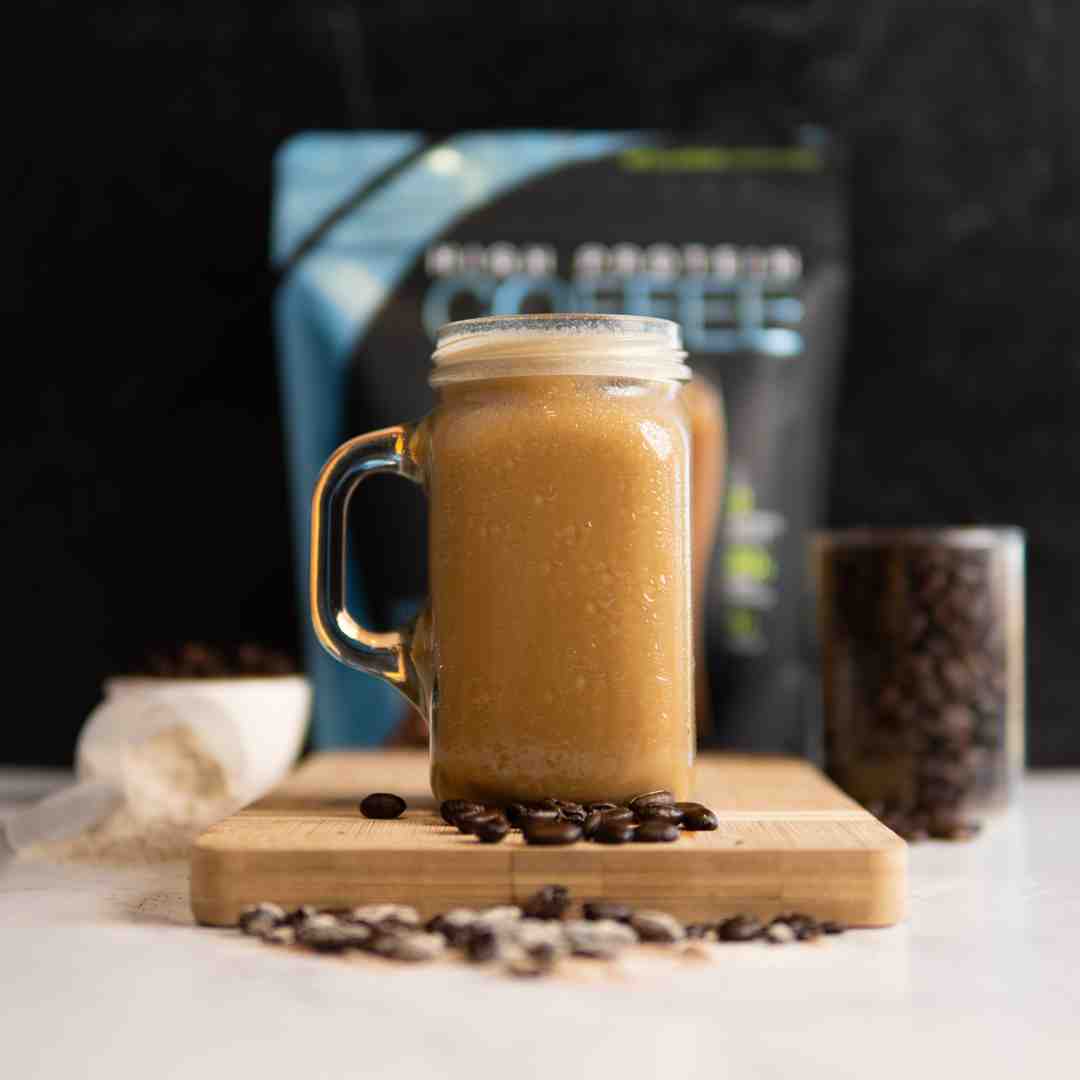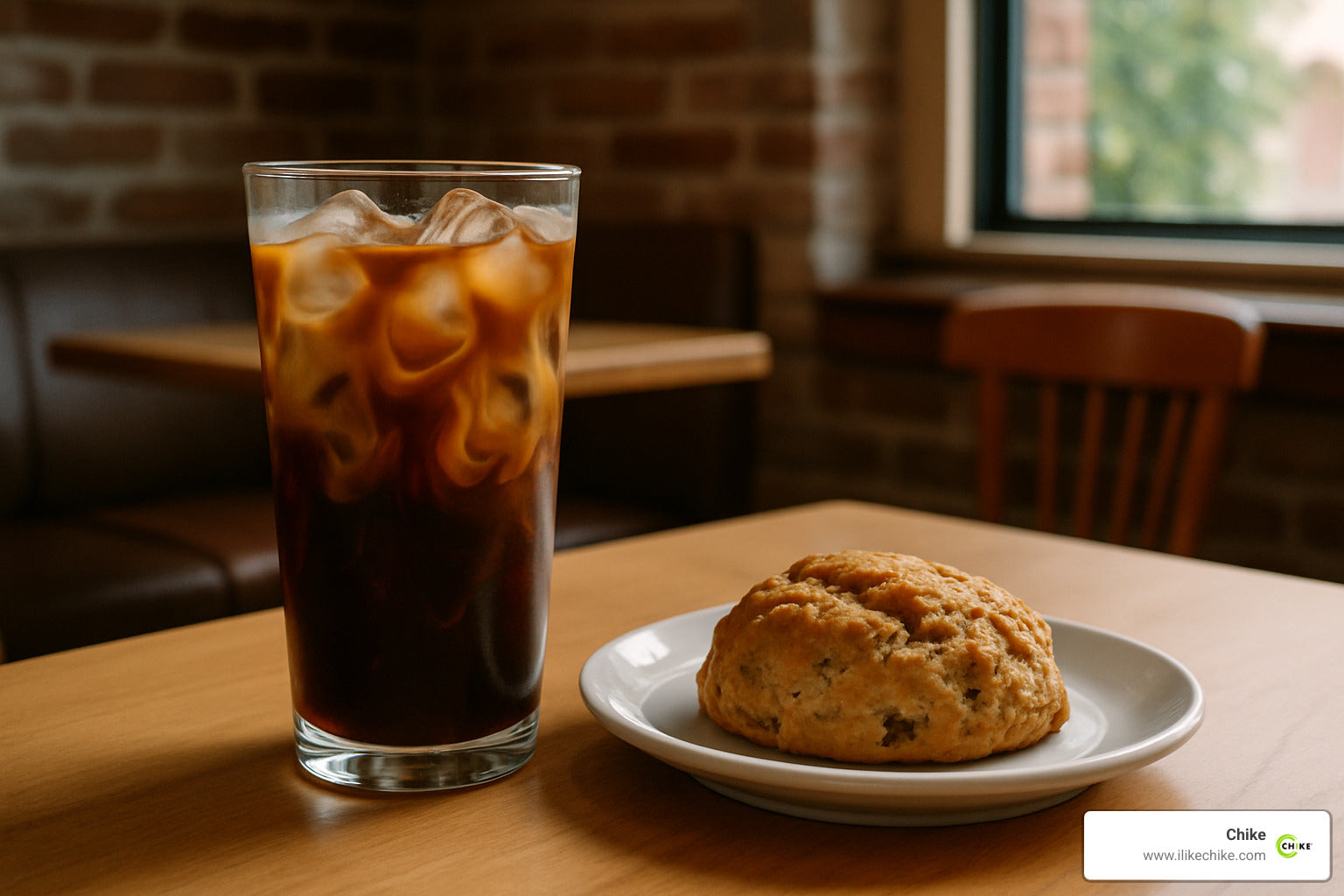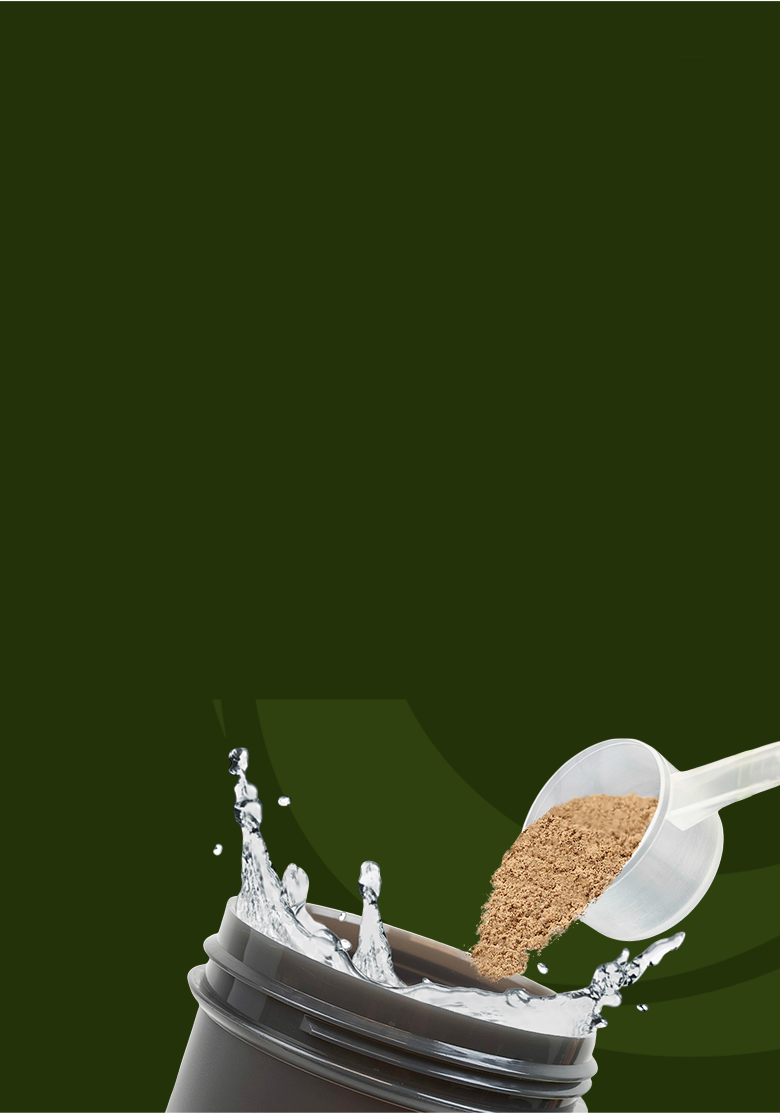 All Posts
All Posts 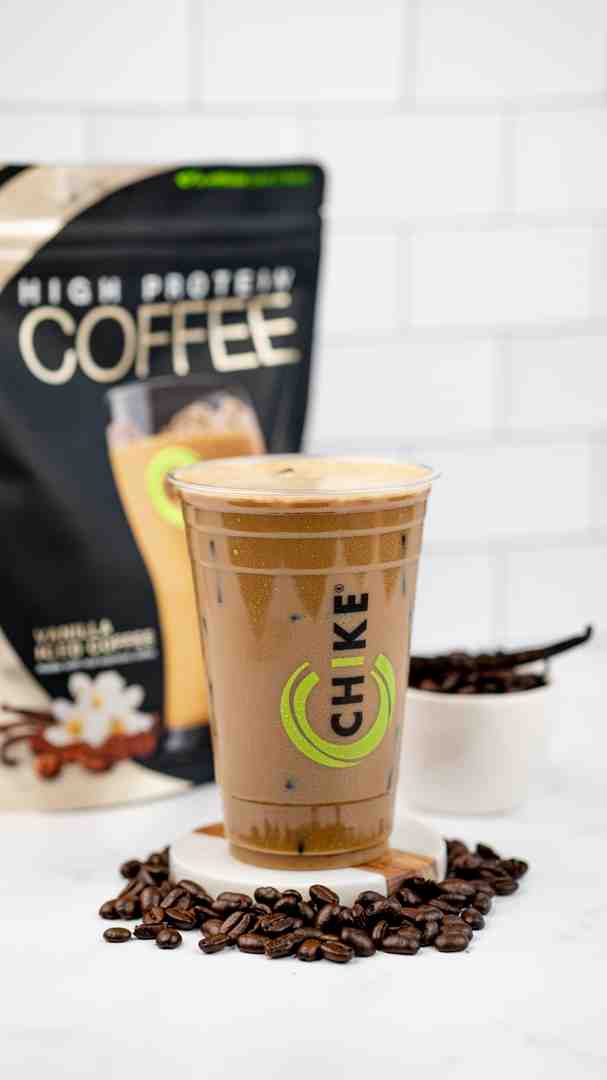
Power Without the Buzz: The Rise of Decaf Coffee Protein
Looking for the best decaf coffee protein options? Here's a quick buying guide:
- Best Overall: Chike Decaf Cappuccino (20g protein, 1g sugar, 2 shots decaf espresso)
- Best Value: Polar Joe Decaf Classic (21g protein, <10mg caffeine per serving)
- Best DIY Option: Mix decaf instant espresso with your favorite unflavored protein powder
- Best Ready-to-Drink: High-protein decaf cappuccino drinks with 15g protein per serving
Decaf coffee protein combines the rich flavor of coffee with muscle-supporting protein while eliminating most of the caffeine jitters. This innovative wellness trend gives you the best of both worlds: the comforting taste of coffee and the nutritional benefits of protein without the sleep disruption or anxiety that can come with regular coffee.
While a typical cup of decaf coffee contains only about 0.2 grams of protein naturally, modern decaf protein products can deliver up to 21 grams per serving with less than 10mg of caffeine. These products offer a perfect solution for evening workouts, caffeine-sensitive individuals, or anyone looking to cut back on stimulants while maintaining protein intake.
The combination works synergistically - protein helps slow digestion for sustained energy, while coffee's antioxidants and polyphenols provide additional health benefits beyond the protein boost. Many options also include minimal sugar and carbs, making them ideal for those watching their macronutrients.
I'm a healthy beverage brand executive (That's me, Mac Mascorro - https://www.linkedin.com/in/macmascorro/) with extensive experience evaluating decaf coffee protein products for busy professionals seeking convenient nutrition solutions. After testing dozens of formulations, I've identified the options that truly deliver on both flavor and function without the caffeine crash.
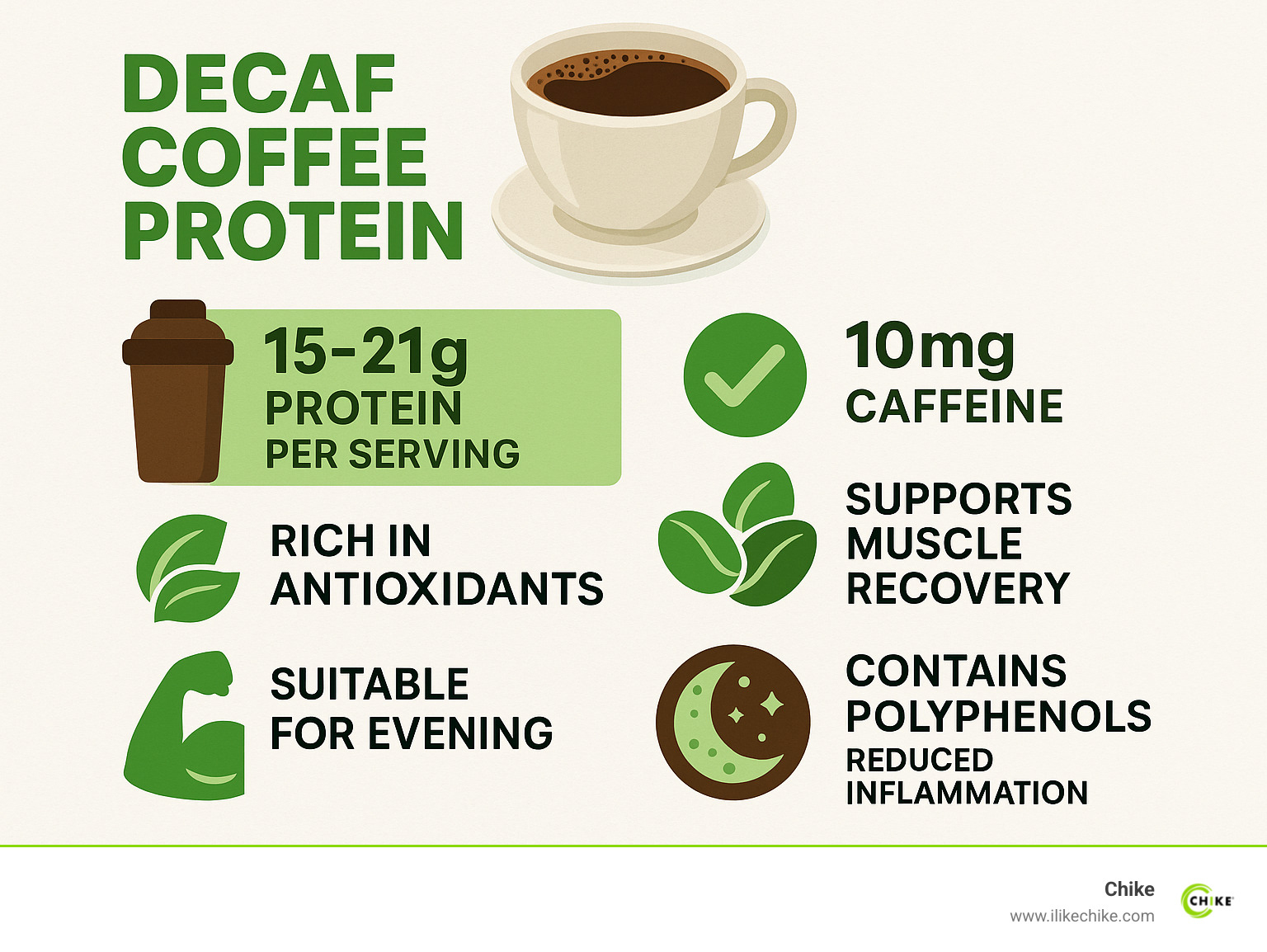
What Is Decaf Coffee Protein?
Decaf coffee protein is the perfect marriage of flavor and function - think of your favorite coffee experience, minus most of the caffeine, plus a hefty dose of muscle-supporting protein. It's the answer for coffee lovers who want the rich taste they crave without the midnight ceiling-staring that often follows.
The idea was born from two worlds colliding: our growing appetite for protein-packed drinks and the rising demand for gentler, low-caffeine options. While your standard cup of decaf coffee barely contains 0.2 grams of protein on its own, modern decaf coffee protein products deliver an impressive 15-21 grams per serving – putting them right up there with dedicated protein shakes.
Did you know coffee beans themselves are surprisingly protein-rich? Green coffee beans pack about 17.7 grams of protein per 100 grams, and even spent coffee grounds contain 13.5–19.5 grams per 100 grams. The problem is, almost none of this protein makes it into your regular cup during brewing. That's why decaf coffee protein products add concentrated protein sources to create something truly nutritional.
What makes these drinks special goes beyond just protein content. They offer a unique amino acid profile with all the essentials, particularly glutamic acid, aspartic acid, and leucine – the superstar amino acid that triggers muscle protein synthesis. Plus, they retain coffee's natural antioxidants, especially chlorogenic acids, which help fight inflammation and support healthy blood sugar levels.
How It's Made
Creating decaf coffee protein involves some fascinating food science:
First comes the decaffeination. Coffee beans undergo one of several gentle methods to remove caffeine while preserving the flavors we love. The most common approaches include the Swiss Water Process (which uses osmosis and carbon filtration), the carbon dioxide method (using pressurized CO2), or solvent-based techniques.
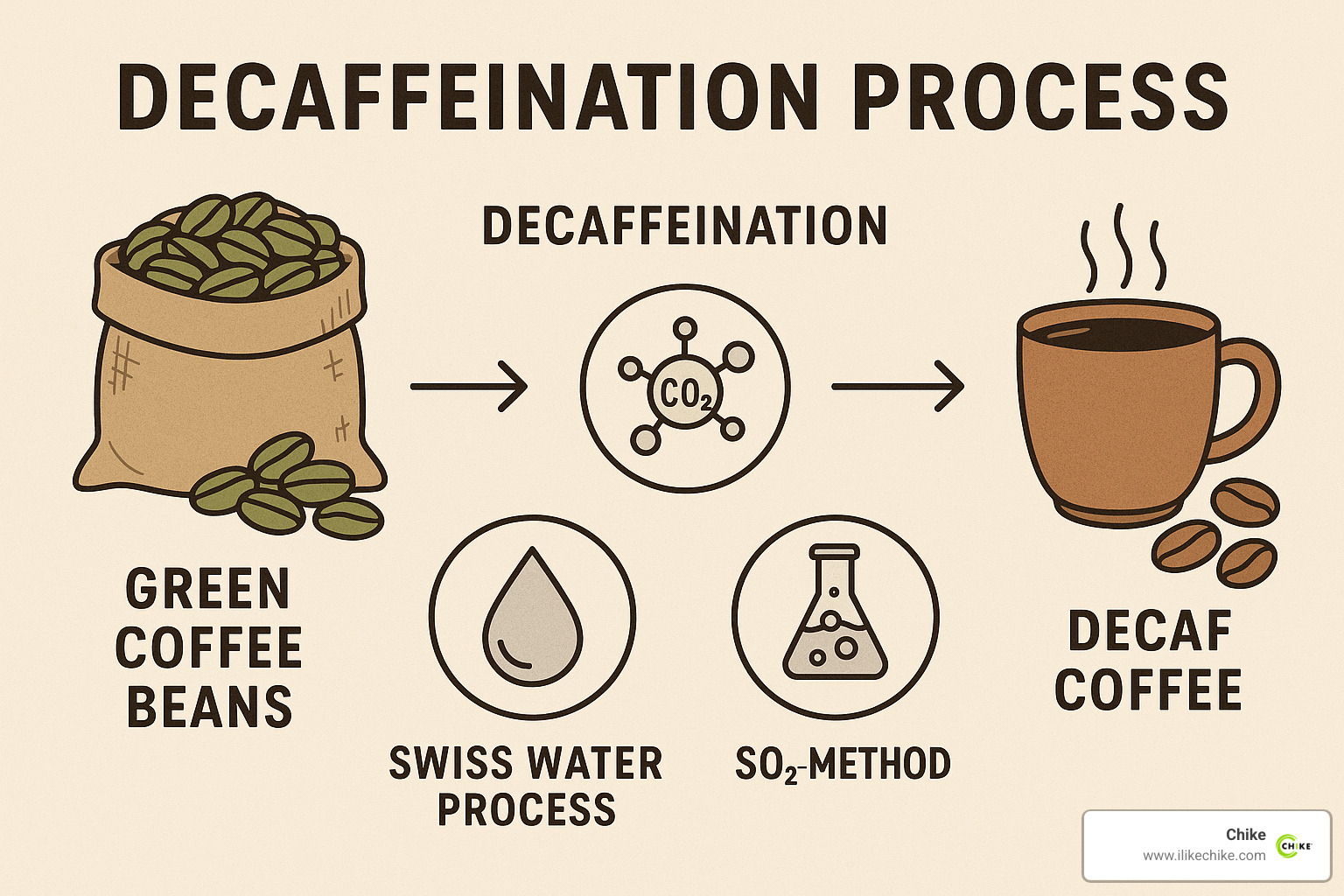
Then comes the protein boost, which happens one of two ways:
Direct addition is the most common approach – simply blending high-quality protein powders (like whey, collagen, or plant proteins) with decaffeinated coffee to create a nutritional powerhouse.
Some innovative companies even extract coffee-derived protein directly from coffee beans or spent grounds using techniques like ultrafiltration (which separates and concentrates proteins through special membranes) or isoelectric precipitation (which adjusts pH to make proteins separate from solution).
The final products come in various convenient forms – powders you can mix yourself, ready-to-drink bottles for on-the-go, or concentrated formulas you can add to water or milk.
Why Go Decaf?
Choosing decaf coffee protein offers some serious advantages for many of us:
Peace of mind with low caffeine content - With typically less than 10mg of caffeine per serving (compared to regular coffee's 80-100mg), you can enjoy your coffee protein without the jitters.
Evening-friendly fuel - One of the biggest perks is being able to enjoy a protein-rich coffee drink after dinner without disrupting your sleep. It's perfect for evening workout recovery or as a healthier dessert alternative.
Steady energy without the crash - Rather than the temporary buzz and inevitable crash from caffeine, the protein in decaf coffee protein provides sustained energy through amino acids that fuel your body more consistently.
Gentler on sensitive systems - Many people find decaf options much more body-friendly. This includes pregnant or nursing women watching their caffeine intake, people with certain heart conditions, those with anxiety disorders, individuals with caffeine sensitivity, or anyone taking medications that don't play nice with caffeine.
As one happy customer shared: "I've always been a coffee lover, but the caffeine made me a nervous wreck. Decaf coffee protein gives me the taste I love and the nutrition I need without feeling like I'm about to jump out of my skin. Best findy ever!"
Decaf Coffee Protein Options to Try
Looking for the perfect decaf coffee protein to fit your lifestyle? I've rounded up some fantastic options that deliver both flavor and nutrition without the caffeine jitters. Whether you prefer powders you can customize or grab-and-go convenience, there's a decaf coffee protein product that's perfect for your needs.
Powders & Mix-Ins
Powder formulations give you the ultimate control over your decaf coffee protein experience. They typically pack the most protein punch per serving while letting you decide exactly how to prepare your drink.
Chike Decaf Cappuccino High-Protein Iced Coffee stands out in this category with its impressive nutritional profile: 20g of high-quality protein per serving, the rich flavor of 2 shots of decaf espresso, and just 1g of sugar. The creamy cappuccino flavor delivers a genuine coffee experience that satisfies your taste buds while supporting your fitness goals.
What makes Chike special is how it solves the common protein powder problem – that chalky, artificial taste that ruins the experience. As one happy customer put it: "Finally found a protein coffee that doesn't taste like chalk! The decaf version is perfect for my evening sweet cravings."
Whether you prefer the convenience of 14-serving bags for home use or the portability of 10-count single-serve packets for travel, Chike has you covered. And mixing couldn't be simpler – just add cold water or milk for a refreshing iced version, or start with a small amount of room temperature liquid for hot preparations. A blender or shaker bottle with a wire whisk ball ensures the smoothest texture.
Want to perfect your mixing technique? Check out more info about what's the best way to mix Chike powders for insider tips.
Ready-to-Drink Shakes
For those days when convenience is king, ready-to-drink decaf coffee protein shakes require zero prep – just grab, shake, and enjoy!
High-Protein Decaf Cappuccino Drinks typically offer around 15g of protein per serving in low-calorie, low-carb formulations that stay fresh in your refrigerator for weeks. They're perfect for tossing in your gym bag or keeping at work for a quick nutrition boost without the caffeine that might derail your afternoon productivity or evening sleep.
Many of these ready-to-drink options do double-duty as meal replacements, with balanced macronutrients and added vitamins and minerals. This makes them particularly valuable during hectic days when proper meals might otherwise be sacrificed to your busy schedule.

Concentrates & Cold Brew Bases
Concentrates offer a clever middle ground between powders and ready-to-drink options, giving you customization with minimal effort.
Decaf Coffee Concentrates with Protein come in liquid form that mixes instantly with water or milk. You control the strength of both coffee flavor and protein content by adjusting how much concentrate you use and what liquid base you choose. Many people love being able to create a lighter morning beverage and a more robust post-workout recovery drink from the same product.
One of the biggest advantages of concentrates is their impressive shelf stability – up to 12 months unopened and about 10 weeks refrigerated after opening. Unlike ready-to-drink options that need constant refrigeration, decaf coffee protein concentrates can live in your pantry until opened, making them ideal for travel, office storage, or emergency nutrition.
DIY "Proffee" Hacks
For the ultimate in personalization, DIY decaf coffee protein approaches give you complete creative control. The process is simple: brew your favorite decaf coffee, add your preferred protein powder, and customize to your heart's content.
Blender Tips for Smooth Results: When making DIY decaf protein coffee at home, temperature matters! For hot versions, try mixing your protein with a small amount of room temperature liquid first before adding hot coffee. Cold brew tends to blend more smoothly with protein powders than hot coffee, and unflavored or vanilla protein powders typically pair best with coffee's natural flavor profile.
Here's a pro tip from coffee protein enthusiasts: Add a tiny pinch of salt to improve the overall flavor and mask any artificial sweetener aftertaste that might come from your protein powder.
Want to take your decaf coffee protein experience to the next level? Try incorporating it into recipes like the delicious Decaf Cappuccino Protein Bundt Cake, which transforms your beverage into a protein-packed dessert with minimal added sugar. It's the perfect way to satisfy sweet cravings while supporting your nutrition goals!
Health & Fitness Benefits of Decaf Coffee Protein
Ever wondered why decaf coffee protein has become such a hit with fitness enthusiasts? It's not just about the taste – there's real science behind why this combination works so well for your body.
Think of decaf coffee protein as your body's best friend after a workout. When you exercise, your muscles develop tiny tears that need protein to repair and grow stronger. With 20-25g of protein per serving, these beverages deliver exactly what your muscles are craving. And since they're decaf, you can enjoy them after evening workouts without lying awake counting ceiling tiles at 2 AM.
Trying to manage your weight? Decaf coffee protein has your back. Protein keeps you feeling full longer than carbs or fats, helping you naturally eat less throughout the day. Most decaf coffee protein drinks pack their protein punch with minimal extra calories, creating the perfect balance for weight management without sacrificing muscle.
But the benefits go beyond just protein. Your cup of decaf coffee protein is actually swimming with antioxidants! Coffee ranks among the richest antioxidant sources in Western diets – providing more antioxidant power than fruits and vegetables combined for many Americans. The decaffeination process preserves these beneficial compounds, particularly chlorogenic acids, which help fight inflammation and improve how your body handles glucose.
The cognitive benefits are impressive too. Regular coffee consumption has been linked to a potential 60% reduction in Alzheimer's risk. With decaf coffee protein, you get these brain-protecting benefits without the jitters or sleep disruption caffeine can cause.
Some decaf coffee protein products include collagen peptides, which may give your joints and bones extra support. This is especially valuable if you're active or dealing with the natural effects of aging on your joints.
Unlike their caffeinated cousins, decaf coffee protein beverages don't have that mild diuretic effect, making them excellent post-workout recovery options that actually contribute to your daily hydration needs rather than potentially working against them.
Scientific research on protein coffee benefits
Protein Quality & Amino Acids
Not all protein is created equal – the quality matters just as much as the quantity in your decaf coffee protein.
The gold standard for measuring protein quality is the Protein Digestibility Corrected Amino Acid Score (PDCAAS). While coffee naturally contains some protein, the added protein in commercial decaf coffee protein products typically comes from high-quality sources like whey (with a perfect PDCAAS score of 1.0) or pea protein (scoring around 0.8).
Leucine is the superstar amino acid when it comes to building muscle. It's like the key that open ups muscle protein synthesis. Quality decaf coffee protein products contain 2-3g of leucine per serving – enough to flip that muscle-building switch and support recovery.
Branched-Chain Amino Acids (BCAAs) – leucine, isoleucine, and valine – play a crucial role in muscle recovery. While early research suggested coffee proteins might be unusually rich in BCAAs, newer studies show their levels are similar to or lower than other plant proteins like soy and pea.
How well your body can use the protein matters too. Research shows coffee-derived protein concentrates have excellent digestibility – up to 96.8% in laboratory tests. This means your body can efficiently absorb and use the amino acids, getting more benefit from each serving.
| Protein Source | PDCAAS | Leucine Content | Digestibility | Best For |
|---|---|---|---|---|
| Whey | 1.0 | High | Excellent | Muscle building, fast absorption |
| Collagen | 0.0 | Low | Good | Joint support, skin health |
| Pea | 0.8 | Moderate | Good | Plant-based, allergen-friendly |
| Coffee-derived | 0.5-0.6 | Moderate | Very good | Antioxidant synergy |
Unique Polyphenols in Decaf Coffee Protein
The hidden gems in your decaf coffee protein are the polyphenols – powerful plant compounds that offer health benefits beyond basic nutrition.
Chlorogenic acids (CGAs) are the stars of the show. These compounds stick around even after the decaffeination process, bringing impressive benefits to your daily cup. They help reduce inflammation markers in the body, improve how your system processes glucose, protect your cells from damage with their antioxidant properties, and may even support heart health.
These compounds are seriously concentrated in coffee – research shows green coffee protein concentrates can contain up to 52.6 mg gallic acid equivalents per gram of polyphenols. That's a scientific way of saying they're packed with these beneficial compounds!
What makes decaf coffee protein special is the teamwork between protein and coffee polyphenols. They create a "better together" effect that you won't find in either component alone. The polyphenols can actually help your body absorb and use protein more efficiently, while the proteins help deliver those polyphenols where they need to go in your body.
The good news? Modern processing methods like ultrafiltration preserve these natural bioactive compounds, ensuring you get the full benefit in your decaf coffee protein drink.
Scientific research on antioxidants
How to Choose and Use Decaf Coffee Protein
Finding your perfect decaf coffee protein match doesn't have to be complicated. With a few key considerations, you'll find a product that fits seamlessly into your lifestyle while delivering the nutrition you need.
When I'm helping clients select their ideal decaf coffee protein, I always start with the basics – what's actually in the product. Look at the protein content first; aim for at least 15g per serving, though 20g or more (like Chike's Decaf Cappuccino with its full 20g) is ideal for supporting muscle recovery and keeping hunger at bay.
Next, check the caffeine content carefully. True decaf coffee protein should contain less than 10mg of caffeine per serving – a fraction of regular coffee's 80-100mg. This minimal amount typically won't trigger sensitivity reactions or sleep issues, even if you enjoy it in the evening.
Sugar content matters tremendously for both taste and health. Many protein drinks hide behind a health halo while packing in surprising amounts of sugar. I recommend looking for options with 5g or less per serving. Chike's formula contains just 1g of sugar, making it friendly for low-carb lifestyles without sacrificing flavor.
Turn the package over and really examine that ingredient list. What type of protein are you getting? Is it whey, collagen, or plant-based? Are the sweeteners natural or artificial? Does it contain actual coffee or just flavoring? The shorter and more recognizable the ingredient list, the better.
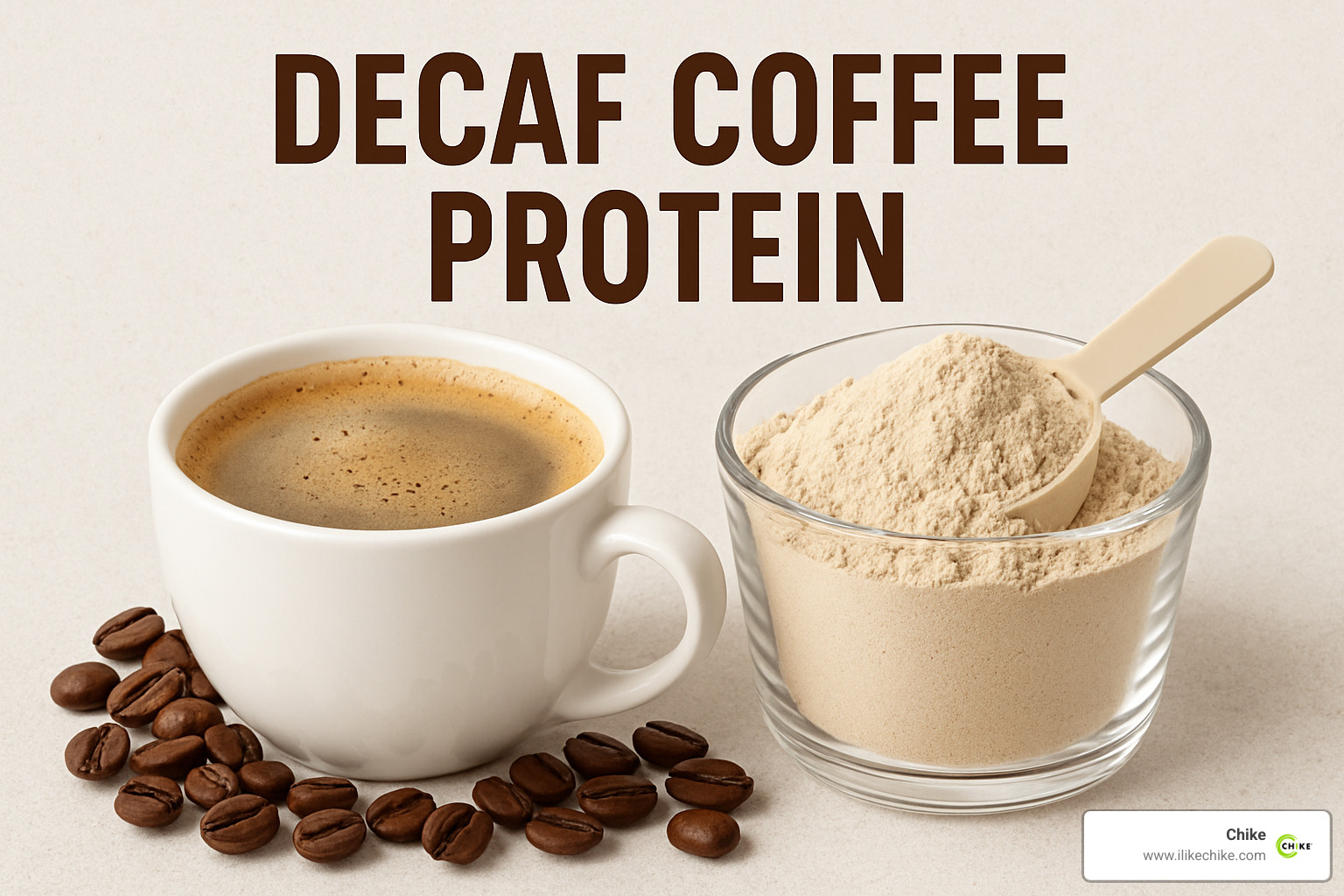
Quality matters too. Look for brands that conduct third-party testing for purity and accurate labeling. This extra step shows a commitment to transparency and quality. Similarly, companies that prioritize sustainably sourced coffee beans and protein ingredients often produce superior products while supporting environmental health.
Serving Timing & Recipes
One of the beautiful things about decaf coffee protein is its versatility throughout your day. Unlike its caffeinated cousins, you can enjoy it anytime without worrying about sleep disruption.
Need a gentle morning start? Decaf coffee protein gives you that comforting coffee ritual with protein-powered staying power, minus the caffeine jitters some people experience. It's perfect if you're caffeine-sensitive but still crave that coffee experience.
Evening workout warriors, rejoice! The 30-60 minute post-exercise window is prime time for protein intake, and decaf coffee protein fits perfectly here without the sleep-disrupting effects of caffeine. I've found this especially helpful for clients who exercise after dinner but struggle with traditional protein options.
That 3pm slump hits everyone occasionally. Rather than reaching for caffeine that might linger in your system at bedtime, try decaf coffee protein for a satisfying pick-me-up through flavor and nutrition alone.
Sweet tooth calling after dinner? Instead of ice cream or cookies, a creamy decaf coffee protein drink can satisfy those dessert cravings with beneficial nutrition instead of empty calories. The protein helps you feel satisfied, while the coffee flavor provides that indulgent experience.
Get creative in the kitchen with your decaf coffee protein! Blend it with frozen banana and cocoa for a mocha smoothie that tastes like a milkshake. Mix it into overnight oats for a coffee-infused breakfast. Use it as the liquid in protein pancake batter, freeze it into popsicles, or try the delicious No-Bake Decaf Coffee Protein Balls for a portable protein-packed snack.
Potential Drawbacks & How to Avoid Them
While decaf coffee protein offers tremendous benefits, being mindful of potential challenges helps ensure the best experience.
Allergen awareness is crucial when choosing any protein product. Many decaf coffee protein options contain common allergens like dairy (in whey protein) or soy. If you have sensitivities, look for clearly labeled allergen-free alternatives or those using gentler protein sources like pea or rice protein.
Digestive comfort varies widely among individuals. Some people experience mild discomfort with concentrated protein or certain coffee compounds. If this sounds familiar, start with half servings to assess your tolerance, drink plenty of water alongside your protein, consider products with added digestive enzymes, or experiment with different protein sources until you find your perfect match.
Sweetener sensitivity is another consideration. Both natural and artificial sweeteners affect people differently. If sweeteners cause you issues, try unflavored versions you can customize yourself, or look for products sweetened with gentler options like monk fruit or stevia. Sugar alcohols (erythritol, xylitol) can cause digestive upset in some people despite their low calorie content.
Finally, balance matters in protein consumption. While increasing protein intake offers numerous benefits, extremely high consumption isn't necessary or beneficial for most people. The general recommendation is 0.8g/kg body weight daily, with active individuals potentially benefiting from 1.2-2.0g/kg. Calculate your personal needs and ensure your decaf coffee protein fits within your overall nutrition strategy rather than excessively adding to it.
Frequently Asked Questions about Decaf Coffee Protein
Does decaf coffee protein build muscle like caffeinated versions?
Yes! Decaf coffee protein works just as effectively for building muscle as its caffeinated cousins. When it comes to supporting muscle growth, it's all about the protein content, not the caffeine. The science shows that consuming 20-25g of quality protein is what optimizes muscle building and recovery, regardless of whether caffeine is along for the ride.
While caffeine certainly has its performance perks during workouts (helping you push harder and feel less fatigued), these benefits are entirely separate from how your body uses protein for muscle repair. In fact, for those evening gym sessions, decaf coffee protein might actually be the superior choice. Why? Because quality sleep is absolutely crucial for muscle recovery and growth, and we all know caffeine can throw a wrench in those sleep plans.
Think of it this way: caffeine might help you during the workout, but protein helps your body after the workout—and decaf coffee protein gives you all the recovery benefits without the midnight ceiling-staring contest.
How much caffeine is left in "decaf" protein coffee?
Decaf coffee protein typically contains less than 10mg of caffeine per serving—about 95% less than your regular cup of joe, which packs 80-100mg per 8oz cup. It's just enough to give you that hint of coffee essence without the jittery side effects.
The exact caffeine content varies depending on how the coffee was decaffeinated:
- The Swiss Water Process is the caffeine removal champion, taking out 99.9% of caffeine
- The CO2 process removes a respectable 96-98%
- Solvent-based methods clear away 96-97%
This tiny amount of remaining caffeine is generally considered safe even for those who are sensitive to caffeine, including pregnant women and people with certain medical conditions. That said, if you're ultra-sensitive to even the smallest caffeine amounts, a quick chat with your healthcare provider might be worthwhile.
One little heads-up: if your decaf coffee protein has cocoa powder or chocolate flavoring, it might contain slightly more caffeine, as these ingredients naturally bring a small caffeine contribution to the party.
Who benefits most from decaf coffee protein?
Decaf coffee protein is a game-changer for several groups of people who want the nutritional benefits of protein coffee without the caffeine kick:
Evening Exercisers love that they can fuel their recovery without lying awake counting ceiling tiles. Since quality sleep is essential for muscle repair, decaf coffee protein offers the perfect solution for post-sunset sweat sessions.
Caffeine-Sensitive Folks who typically experience the coffee jitters, racing heart, anxiety spirals, or digestive drama can finally enjoy the rich flavor and nutritional perks of coffee protein without the unwanted side effects.
Pregnant and Nursing Moms often need to watch their caffeine intake while simultaneously needing quality nutrition. Decaf coffee protein provides a delicious way to get important nutrients without exceeding recommended caffeine limits.
People Managing Certain Health Conditions like high blood pressure, heart rhythm issues, acid reflux, or anxiety disorders often need to limit caffeine but still benefit greatly from convenient protein sources.
Adults Over 40 face increasing protein needs to combat age-related muscle loss. Since older adults sometimes metabolize caffeine more slowly, decaf coffee protein offers an ideal solution for age-appropriate nutrition without sleep disruption.
Sleep Quality Champions who prioritize their precious rest can enjoy decaf coffee protein anytime without worrying about caffeine's 5-6 hour half-life interfering with their sleep architecture.
The beauty of decaf coffee protein is that it delivers all the flavor and nutritional benefits of protein coffee while respecting your body's need for quality sleep and caffeine-free living. It's protein with a purpose, minus the buzz!
Conclusion
Decaf coffee protein offers the perfect harmony of taste and nutrition for anyone wanting the benefits of protein-enriched coffee without caffeine's potential downsides. This innovative beverage category has truly revolutionized how we think about protein delivery – proving that nutrition doesn't have to sacrifice flavor or enjoyment.
When you sip a decaf coffee protein drink, you're getting so much more than just a tasty beverage. You're supporting muscle recovery after those evening workouts. You're managing your weight with a satisfying, low-sugar option. You're flooding your body with beneficial antioxidants. And you're doing it all while enjoying that rich, comforting coffee flavor you love – minus the jitters and sleep disruption.
Chike's Decaf Cappuccino High-Protein Iced Coffee truly stands out in this space. With 20 grams of quality protein, just 1 gram of sugar, and the bold flavor of two shots of decaf espresso in every serving, it hits that sweet spot between nutrition and indulgence. It's the perfect introduction for anyone curious about trying decaf coffee protein for the first time.
I've seen how transformative these products can be for different people. Evening exercisers who finally found a recovery drink that doesn't keep them up at night. Caffeine-sensitive folks who thought they had to give up coffee completely. Parents looking for convenient nutrition during hectic days. The versatility of decaf coffee protein makes it accessible to almost everyone.
What's particularly appealing about this trend is its sustainability for long-term health goals. Unlike extreme diets or complicated supplement regimens, incorporating decaf coffee protein into your routine feels natural and enjoyable – making it something you can actually stick with.
Whether you're mixing it into your morning routine, using it as post-workout recovery, or enjoying it as an evening treat to satisfy sweet cravings, decaf coffee protein provides jitter-free fuel that supports your body's needs while delighting your taste buds.
Ready to experience the smooth, muscle-supporting power of decaf coffee protein for yourself? Grab your Decaf Cappuccino High-Protein Iced Coffee here and find why so many health-conscious coffee lovers are making this delicious, protein-packed beverage a staple in their wellness routines.

 LOVED BY 2,500,000+ CUSTOMERS
LOVED BY 2,500,000+ CUSTOMERS FAST NATIONWIDE SHIPPING
FAST NATIONWIDE SHIPPING SECURE CHECKOUT
SECURE CHECKOUT CLEAN INGREDIENTS
CLEAN INGREDIENTS